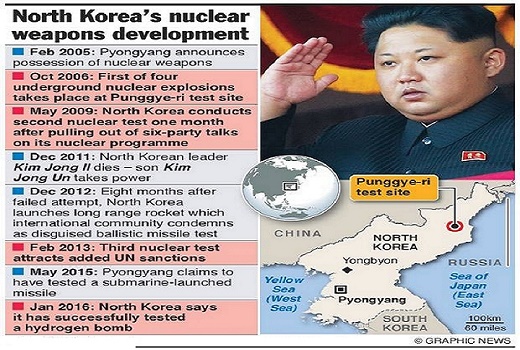Accepting the Unacceptable by James Robbins
The nuclear threat from North Korea continues to grow, despite numerous strong statements of concern from the United States. But Pyongyang knows that talk is cheap. The more powerful message from American inaction is: keep building.
Last week, North Korea tested what appeared to be a miniaturized nuclear warhead designed to be deployed on a ballistic missile. And this smaller weapon packed the biggest punch yet from Pyongyang’s atomic program. At 20-30 kilotons, it was around three times more powerful than the weapon tested last January.
The White House reacted with typical bluster, saying President Obama would “continue to consult our allies and partners” to “ensure provocative actions from North Korea are met with serious consequences.” But this is the same type of rhetoric the administration used after each of the four North Korean nuclear tests that happened on Obama’s watch. If there have been serious consequences, Pyongyang has not noticed.
The Defense Department, meanwhile, groused that the test was a “flagrant violation” of several United Nations Security Council resolutions. Indeed, the entire illicit nuclear program is a flagrant violation, but resolutions haven’t stopped it. North Korea first tested a nuclear weapon 10 years ago, and now has a nuclear inventory estimated at 15-20 weapons. And as last week’s test showed, their weapons are getting stronger and more sophisticated.
South Korean President Park Geun-hye stated that “the only thing that [the] Kim Jong Un regime can gain from the nuclear tests is stronger sanctions from the international community and its isolation.” This is not much of a threat to a country that actively seeks isolation from the outside world, and has for decades. And it is hard to see how the sanctions regime on North Korea could be much stronger, or how it could happen without increasing the misery of the people captive in that totalitarian dystopia.
The fact is that there have been no real consequences, if the metric of success is altering North Korea’s behavior. If anything, U.S. inaction sends the message that pushing ahead on the nuclear front is Pyongyang’s quickest road to international power and respect.
The wobbly 2015 nuclear agreement with Iran is no doubt a major inspiration. Tehran received billions of dollars simply for promising not to do what North Korea is already doing – that is, not to do it anytime soon. And the verification protocols of the deal are so weak that Iran could be continuing its nuclear program without Western knowledge, perhaps even with North Korean assistance. Furthermore, secret side deals keep being revealed that show that the agreement was even worse than critics suspected.
Pyongyang is simultaneously developing more sophisticated and longer range delivery systems to carry its new generation or warheads. Again, this is a sector in which fruitful cooperation with Iran is possible, since Tehran’s missile program is more advanced and (according to Iran) not limited by the nuclear agreement.
Democratic presidential candidate Hillary Clinton drew a red line after the test, declaring that it would be “unacceptable” for North Korea to possess nuclear weapons that could reach the American mainland. This just shows how weak our hand has become. Twenty years ago, it was “unacceptable” for North Korea to even have nuclear weapons. Ten years ago, it was “unacceptable” to continue to build more nuclear weapons. Now the de facto policy seems to be that they can test and possess all the nuclear weapons they want so long as they don’t do anything with them. The U.S. accepts a lot of the supposedly unacceptable.
North Korea, for its part, is going to push that line back as far as it can until the United States does something about it. The longer we wait, the worse the consequences will be.
James S. Robbins is senior fellow for national security affairs at the American Foreign Policy Council and the author of This Time We Win: Revisiting the Tet Offensive.



